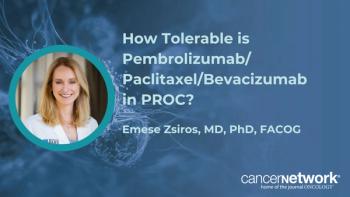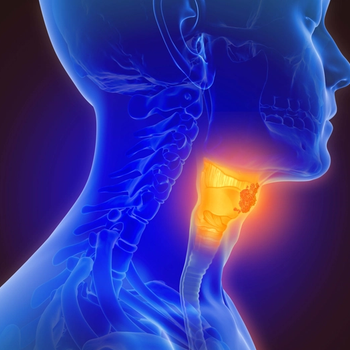
Education on Post-Talquetamab Taste Changes May Help Manage Symptoms
Samantha Shenoy, NP, MSN, emphasized educating patients with multiple myeloma to help prepare them for potential taste alterations after talquetamab.
CancerNetwork® spoke with Samantha Shenoy, a nurse practitioner at the Cancer Immunotherapy Clinic of University of California San Francisco Health, about methods for managing taste alterations following talquetamab-tgvs (Talvey) for patients with heavily pretreated multiple myeloma.
Shenoy emphasized a beneficial relationship with dieticians over several years that has helped her to develop an educational handout that prepares patients for taste alterations following treatment with talquetamab. She then outlined techniques for addressing taste alterations and dry mouth, particularly regarding the use of dry mouth lozenges, melts, and good hydration.
She explained that a nutritionist may only need to be consulted for patients who are at a higher risk for weight loss. She concluded by saying that most patients would benefit from reading the handout prior to undergoing treatment with talquetamab so they are aware of the possibility for taste alterations and dry mouth, as well as methods for managing symptoms.
Transcript:
I was lucky in that I worked with great dieticians early on. I saw patients on study almost 4 years ago. I had great dietitians who worked with my patients and gave me a lot of the tips that are now in my handout, which I think [others] have seen. There is [nothing] that we have not done. I have heard of other people attempting prophylactic measures. Within our institution, specifically, we worked with patients to find different techniques to address different taste changes or dry mouth.
For example, if a patient is saying something tastes salty or sweet, we have different recommendations for all the taste alterations. [We have recommendations] if something is bitter or if they have dry mouth; if your mouth is dry, you are not going to be able to taste very well. [What] I learned throughout this process is we have to address dry mouth, because without saliva, you are not going to be able to taste very well. [We came] up with interventions for that: dry mouth lozenges, tart candies such as lemon citrus, and good hydration. There [are many] dry mouth melts such as XyliMelts.
People have asked me, “Should I be consulting nutrition?” That seems like a lot. I said absolutely not, because I feel like that is most important for the patients who are at high risk of weight loss. I do think from the very beginning they should be teamed up with a nutritionist. Otherwise, I would say the best next line of defense is to give them a good handout, and that is what we have done. From everything that I learned when working with these patients on trial, I put together…this handout. Then, in my personal experience, patients would come in and tell me, “Sam, this really worked for me.” Then I would add that. One of the best things you can do is give this to patients ahead of time. That’s the key.
Newsletter
Stay up to date on recent advances in the multidisciplinary approach to cancer.










































